| Srl | Item |
| 1 |
ID:
188816
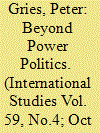

|
|
|
|
|
| Summary/Abstract |
A growing literature demonstrates that ideology shapes international relations. But just how does ideology have its effect? This article develops an integrated model of mediators and moderators of the impact of ideology on foreign policy. Specifically, it hypothesizes that ideologically motivated perceptions of threat and national power sequentially mediate the impact of individual-level ideologies on foreign policy preferences, and that in/out-group social categorization processes moderate the relationship. We interrogate these propositions with three plausibility probe case studies. The conclusion discusses which aspects of the model were best supported by the plausibility probes—and suggests hypotheses for future causal testing.
|
|
|
|
|
|
|
|
|
|
|
|
|
|
|
|
| 2 |
ID:
083615
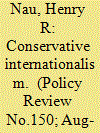

|
|
|
| 3 |
ID:
097962
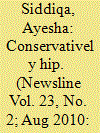

|
|
|
| 4 |
ID:
086400
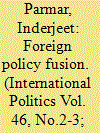

|
|
|
|
|
| Publication |
2009.
|
| Summary/Abstract |
Several tendencies in US foreign policy politics generated a new foreign policy consensus set to outlast the Bush administration. Three developments are analysed: increasing influence of conservative organizations - such as the Heritage Foundation, and of neoconservatism; and, particularly, democratic peace theory-inspired liberal interventionism. 9-11 fused those three developments, though each tendency retained its 'sphere of action': Right and Left appear to have forged an historically effective ideology of global intervention, an enduring new configuration of power. This paper analyses a key liberal interventionists' initiative - the Princeton Project on National Security - that sits at the heart of thinking among centrists, liberal and conservative alike. This paper also assesses the efficacy of the new consensus by exploring the foreign policy positions and advisers of President-elect Barack Obama and his defeated Republican rival, Senator John McCain, concluding that the new president is unlikely significantly to change US foreign policy.
|
|
|
|
|
|
|
|
|
|
|
|
|
|
|
|
| 5 |
ID:
163308
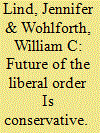

|
|
|
|
|
| Summary/Abstract |
The liberal world order is in peril. Seventy-five years after the United States helped found it, this global system of alliances, institutions, and norms is under attack like never before. From within, the order is contending with growing populism, nationalism, and authoritarianism. Externally, it faces mounting pressure from a pugnacious Russia and a rising China. At stake is the survival of not just the order itself but also the unprecedented economic prosperity and peace it has nurtured
|
|
|
|
|
|
|
|
|
|
|
|
|
|
|
|
| 6 |
ID:
061566
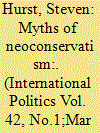

|
|
|
|
|
| Publication |
Mar 2005.
|
| Summary/Abstract |
The objective of this article is to refute the popular and influential view that neoconservatism is the driving force behind US foreign policy under George W. Bush. In fact, neoconservatism ¾ properly understood ¾ has been a marginal influence on a foreign policy, which has been characterized primarily by a different kind of conservative ideology. In order to demonstrate this, the article firstly seeks clearly to define contemporary neoconservatism in the foreign policy context; it then goes on to examine the Bush foreign policy and its key elements. What all this reveals is that US policy has been more driven by nationalist impulses than neoconservative ones. Indeed, those like Stefan Halper and Jonathan Clarke who argue that neoconservatism has been the key component shaping the Bush outlook, not only exaggerate the influence of one particular ideology but underestimate the importance of other key factors determining American policy since 2001.
|
|
|
|
|
|
|
|
|
|
|
|
|
|
|
|
| 7 |
ID:
092367
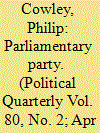

|
|
|
|
|
| Publication |
2009.
|
| Summary/Abstract |
The Conservative parliamentary party will fulfill three important functions for any incoming Conservative government: it will be the focus of attention for the national media; it will be the bulk vote that will deliver its legislative programme; it will form the talent pool from which members of any incoming government will be recruited. A majority Conservative government could see a majority of its MPs newly elected, with more Conservative women and ethnic minority MPs than ever before (although there will be little change in the socio-economic background of their MPs). These new MPs will present problems in terms of party management, although they will be less likely to rebel than longer-serving MPs. There are also relatively few signs of discontent among incumbent Conservative MPs (the article identifies the most rebellious Conservative MPs). Any new Conservative government will also have to deal with a reformed House of Lords, in which it will no longer have a majority.
|
|
|
|
|
|
|
|
|
|
|
|
|
|
|
|
| 8 |
ID:
128004
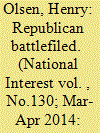

|
|
|
|
|
| Publication |
2014.
|
| Summary/Abstract |
THE COMMON wisdom holds that the GOP 2016 presidential race will boil down to a joust between the "establishment" and the "insurgents." The former will allegedly be more moderate and the latter more conservative. Since most polls for two decades have shown that around two-thirds to 70 percent of self-described Republicans call themselves conservative, this elite narrative will focus on just how much the establishment candidate will need to be pulled to the right in order to fend off his insurgent challenger.
|
|
|
|
|
|
|
|
|
|
|
|
|
|
|
|
| 9 |
ID:
161755
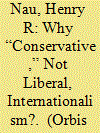

|
|
|
|
|
| Summary/Abstract |
There is no broad literature defining conservative internationalism as there is for liberal internationalism and realism. Yet conservative internationalism differs from liberal internationalism and realism in four important ways. First, it seeks a world of limited government or separate sovereign nations not big international institutions. Second, it believes that national security is a function of ideological differences not just relative power or diplomatic misunderstandings. The democratic peace is a much safer world for America than the balance of power or United Nations. Third, it recognizes the need to use force during negotiations, not just after negotiations fail, because authoritarian states will not take negotiations seriously if they can achieve their objectives outside negotiations. And fourth, it advances democracy conservatively by prioritizing regions where strong democracies exist nearby (today Ukraine and Korea) and by using military leverage to reach timely compromises that weaken authoritarian states.
|
|
|
|
|
|
|
|
|
|
|
|
|
|
|
|